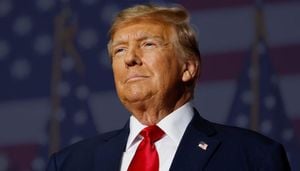Diplomatic efforts are reaching boiling point as international concerns mount over the geopolitical shifts expected with Donald Trump's recent return to the U.S. presidency. This series of events is forcing nations to reassess their strategies and alliances, particularly as leaders deliberate on the ramifications for issues ranging from the war in Ukraine to relations with North Korea and China.
On November 14, 2024, President Joe Biden embarked on his six-day expedition to South America, which includes attendance at the Group of 20 summit taking place in Brazil. Here, discussions surrounding significant global issues like climate change, economic cooperation, and the war on drugs are anticipated. But the backdrop of this summit casts Biden's presidency as one filled with uncertainty and urgency as all eyes are on Trump's administration and its potential impacts.
World leaders are vying for insight on how Trump’s foreign policies might shift, leading to apprehension and strategizing among allies. South Korean President Yoon Suk Yeol is already making preparations, dusting off old golf clubs for the possibility of bonding with Trump, who is known for his affinity for the sport. Analysts are weighing Biden’s current position as not just a typical lame duck, but as one facing imminent policy contradictions and strategic dilemmas due to the incoming administration.
Trump’s election, which some analysts suggest was foretold by early positive indications from voting patterns, has left European capitals wrestling with the possibilities of dealing with a more isolationist America. With the fear of decreased support for Ukraine, nations are bracing for Trump's anticipated altering of U.S. foreign commitments, especially those related to military and humanitarian aid.
Meanwhile, Russia is already signaling intentions to solidify its positioning within Ukraine as it reportedly prepares terms for potential peace negotiations. Moscow is eager to dictate conditions even before Trump takes office, complicatively tying Kyiv’s fate to the fraught international dynamic. Speculation is rife on whether Trump will reconfigure America's longstanding commitment to Ukraine, especially with figures like Trump’s running mate, JD Vance, previously criticizing aid sent to Ukraine.
On the ground in Ukraine, military concerns are pressing harder than ever. Ukrainian forces report increased drone attacks and the presence of troops from North Korea assisting Russia. Just last year, North Korea’s military presence was marginal, but now, it’s estimated they’ve sent over 10,000 troops to fight alongside Russian forces. This shift brings unanticipated complications to current geopolitical dynamics; many fear it could incite instability not just for Ukraine, but for the broader Indo-Pacific region.
Allies meeting at the G-20 are expected to confront China about its tacit support of North Korea amid growing alarms about its military capabilities gaining ground due to Russian assistance. The relationship between North Korea and Russia undercutting regional security has placed the continuing integrity of U.S.-led alliances under scrutiny.
Further complicative threads emerge from another conversation thread; Latvians recently convened political consultations with Chinese officials focused on security matters and their bid for a temporary UN Security Council seat for 2026-2027. This was marked by heavy discussions around European security and international law, leading to Latvia's appeal for renewed attention from Chinese leadership amid growing tensions and the war's enduring global disruption.
The political dialogue between Latvia and China does not escape the higher stakes attention of NATO and other Western powers. Chinese Foreign Minister Deng Li indicated intentions to establish solidified cooperation with Latvia, presenting it as pivotal to regional vs. global interests. Latvia's political maneuvers reflect broader concerns about its own security needs echoing throughout Eastern Europe, where proximity to the specter of Russian aggression looms heavily.
While these conversations carry the weight of sovereignty and security concerns, they are channeled through the lens of both experience and expectation as nations seek clarity on the complexity of existing geopolitical dynamics. Attempts to garner Chinese support recognize the pivotal nature of alliances at this juncture, creating questions of fidelity and expectation as existing powers contend with the anticipated shifts brought about by the Trump administration.
The international climate this autumn is potent with anticipation as these nations redefine their roles on the world stage amid the shifting tides of America's diplomatic approach and its ripple effects worldwide. This series of exposures not only anticipates new negotiations within international frameworks, but requires decisive action to affirm one’s positioning and aims, as the globe braces for what could be the most tumultuous phase since the onset of the Ukraine conflict.
Additional remarks from various leaders heighten the pressure at each turn. Biden's administration is reportedly preparing all mechanisms to reinforce support for Ukraine before Trump's ascendance back to the presidency. The urgency lies not merely to solidify Ukraine's autonomy, but also to command regional allies synchronizing preparations for impending political shifts.
With stakes this high, many nations recognize the necessity for urgent reassessments, deploying diplomatic dialogues amid the hustle of summits, bilateral talks, and multilateral agreements. This is the moment of truth for international relations, steering ire toward common goals, or dividing erstwhile allies amid impending political convolutions.
What does this mean for future engagements? Populations across the globe are now equipping themselves to navigate the intersections of alliances, focusing on the potentiality of relationships lost and the imperative collective efforts needed to retain peace and stability as the world edges ever closer toward potential unrest with the expected transition of power.
These diplomatic discussions mark more than just moments of exchange—they encapsulate the threads of history as nations grapple with longstanding expectations now pivoted by the results of elections, reaffirming the stakes shifted with each passing moment. With each passing day, citizens and leaders alike hold their breaths, awaiting the changes to come and the role each country will play amid the steady currents of international diplomacy and security.



